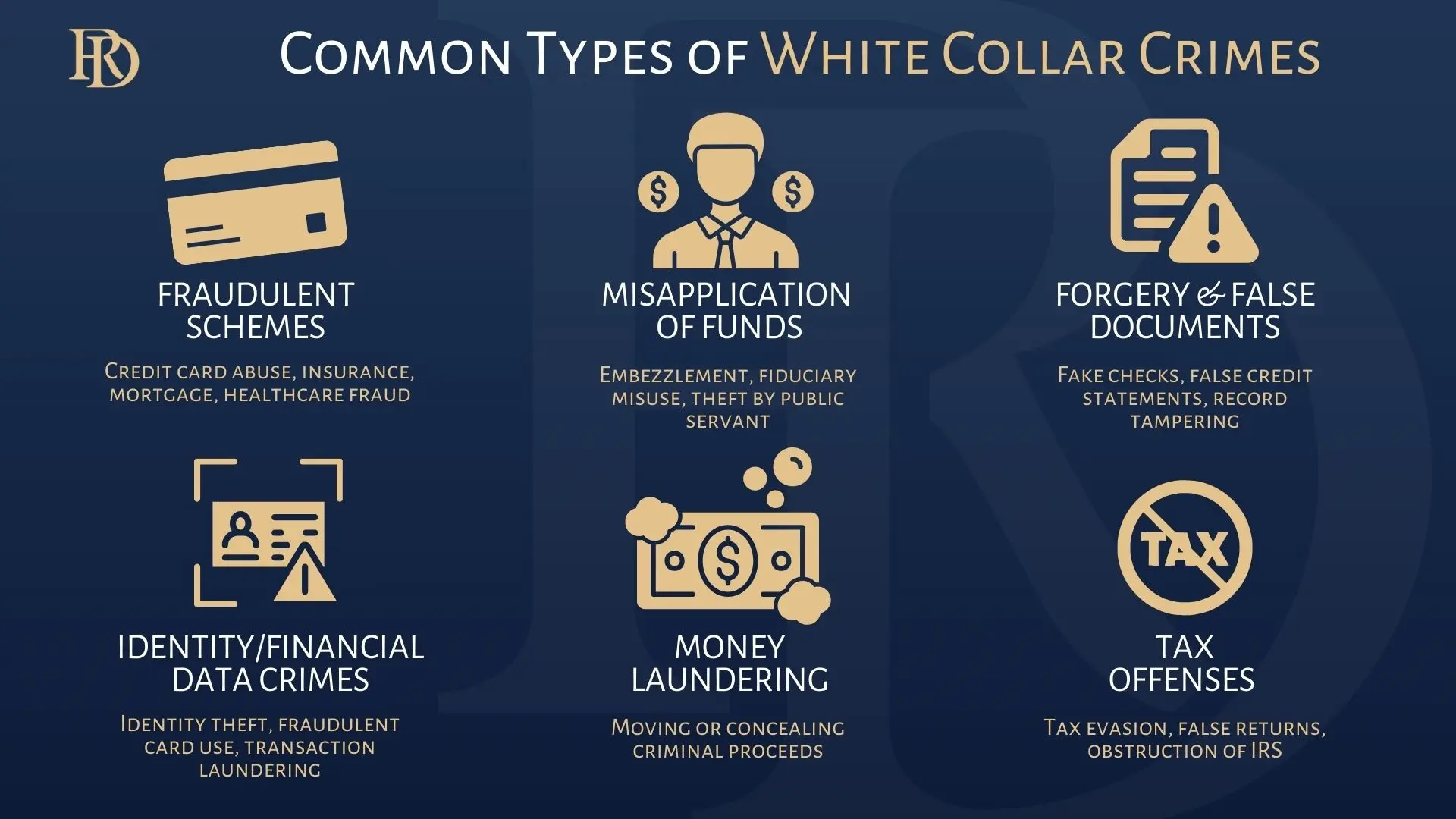
Round Rock White Collar Crimes Lawyer
White collar investigations move fast — and the stakes are high. If agents, auditors, or detectives contact you, do not give a statement to “clear things up” without having counsel present. Speak with Ryan H. Deck, a Texas Board-Certified criminal defense lawyer serving Williamson County, before you talk to law enforcement or the IRS.
What Are White Collar Crimes in Texas

“White collar” crimes are non-violent offenses typically involving deception for financial gain. In Texas, these cases are charged under theft, fraud (Texas Penal Code Ch. 32), forgery, money-laundering (Ch. 34), and related statutes; some matters (like tax fraud) are prosecuted federally.
Attorney Ryan H. Deck brings deep knowledge of Texas law and local courts to defend professionals, employees, and business owners in Williamson County.
Common Texas white collar charges include:
- Fraudulent schemes: Credit/debit card abuse, insurance fraud, mortgage fraud, securities fraud, healthcare fraud, wire/mail fraud (state or federal).
- Misapplication of funds: Embezzlement, misapplication of fiduciary property, theft by a public servant.
- Forgery & false documents: Forging checks/contracts, false statements to obtain credit, tampering with government records.
- Identity/financial data crimes: Fraudulent use/possession of identifying information, credit card transaction record laundering.
- Money laundering: Conducting transactions with criminal proceeds, concealing or transferring illicit funds.
- Tax offenses (federal): Tax evasion, filing false returns, false statements to the IRS, obstructing the tax laws.
Penalties for White Collar Crimes in Texas
Penalties for white collar crimes in Texas depend on the value involved, the type of offense, and whether state or federal law applies.
Sources: Texas Penal Code Ch. 12, 32, 34; 26 U.S.C. § 7201.
Consequences of a White Collar Crime Conviction
Even without a prison sentence, the collateral damage from a white collar conviction can be devastating and long-lasting:
Professional Damage
A conviction for fraud, tax evasion, or making false statements often leads to license discipline, permanent loss of positions of trust, and disqualification from fiduciary roles — critical for corporate taxpayers, accountants, and executives.
Financial Impact
Courts frequently impose restitution orders, heavy fines, and judgments, and may also expose you to civil lawsuits or asset freezes. In tax fraud cases, the Internal Revenue Service may pursue unpaid tax liability even after criminal prosecution.
Long-Term Restrictions
Convictions may result in probation terms, compliance monitoring, or court-ordered financial disclosures that make everyday financial and tax matters burdensome.
Immigration & Travel Limits
Fraud, felonies, and federal tax crimes can trigger removability, visa denials, or permanent bars on entry, creating unique risks for non-citizens.
Reputation & Privacy Harm
Once you are charged with committing tax fraud, filing a false return, or another white collar offense, the record becomes public. Employers, licensing agencies, and background check services may access these records indefinitely, harming both reputation and privacy.
How to Fight White Collar Crime Charges
White collar prosecutions (especially federal tax fraud investigations) move quickly. A strong defense strategy must be built early to control exposure and preserve your legal rights:
- Evidence control: Immediate action to preserve documents, issue legal holds, and review subpoenas is essential. Our defense lawyers push back against evidence obtained by federal law enforcement agencies through unlawful searches or overbroad criminal tax investigations.
- Intent challenges: Prosecutors must prove a willful attempt to evade or defeat tax or commit fraud. We highlight good-faith reliance on accountants or attorneys, honest mistakes in tax obligations, or a lack of specific intent to show that the case does not meet the high bar required.
- Amount & aggregation: Many penalties are tied to loss amounts. We dispute inflated calculations, challenge how the government aggregates “one scheme” across multiple transactions, and question whether the alleged conduct is even considered tax fraud under federal law.
- Forensic rebuttal: By using independent accountants and tax fraud lawyers, we scrutinize IRS data, metadata, and financial records. Our reviews often uncover errors in the government’s narrative or expose weaknesses in special agents’ reports from IRS-CI investigations.
- Negotiation pathways: Through early advocacy, we engage federal prosecutors, DOJ attorneys, and IRS counsel to seek alternatives to criminal prosecution. Strategies can include voluntary disclosures, proffers, or restitution agreements to resolve the matter without a felony conviction.
How We Can Help You

At every stage, our white collar crimes lawyer works to minimize the risk of conviction, protect your livelihood, and fight for a favorable outcome:
- Early intervention: We act quickly when federal agents or IRS CI investigators contact you, ensuring you don’t make false statements or admissions that can strengthen the prosecution’s case.
- Strategic case mapping: By applying a thorough understanding of tax law, corporate liability, and fraud statutes, we identify weaknesses in criminal tax cases and potential defenses that others might overlook.
- Litigation readiness: We file motions to suppress illegally obtained records, challenge the admissibility of false documents, and contest the testimony of IRS or DOJ prosecutors’ experts.
- Resolution options: Whenever possible, we work to have charges dismissed, negotiate reduced penalties, or achieve outcomes that avoid prison, often by demonstrating restitution, compliance improvements, or successful resolution of federal tax responsibilities.
- Trial defense and beyond: If a trial is unavoidable, we prepare a strong defense aimed at reasonable doubt, exposing gaps in the prosecution’s evidence, and fighting for acquittal. Post-trial, we also advise on appeals and options to protect your financial and professional future.

Target

Have You Been Accused of a White Collar Crime in Texas?
One investigator's interview can decide your case. Do not speak to investigators alone. Call Ryan H. Deck for immediate, confidential guidance and a defense strategy.

Start Your Defense Now
Tell us what happened in a confidential setting. Get a free case review with Ryan H. Deck, a Texas Board-Certified criminal defense lawyer with almost two decades of experience defending charges in Round Rock and Williamson County. He offers personalized attention, strategic legal defense, and straightforward advice tailored to your situation.
Take the first step toward protecting your future today.


Frequently Asked Questions
This is some text inside of a div block.
Is tax fraud state or federal?
Most tax fraud criminal charges are federal and investigated by IRS-CI, but some tax-related schemes can be charged under Texas fraud laws as well.
What is “tax evasion” under federal law?
Willfully attempting to evade or defeat a tax (e.g., false returns, hidden income) is a felony punishable by up to 5 years and significant fines.
What if the alleged loss is inflated?
The dollar value of the claimed lost amounts is often disputed. We challenge calculations, causation, and aggregation that can drive sentencing and enhancements.
Will I go to prison for a first offense?
Outcomes vary by loss amount, role, and guidelines. Alternatives exist, but prison is possible, especially in high-loss or laundering cases.
What should I do if I receive a subpoena or target letter?
Contact counsel immediately. Do not destroy documents or any potential evidence. We’ll assess scope, assert privileges, and respond strategically.


